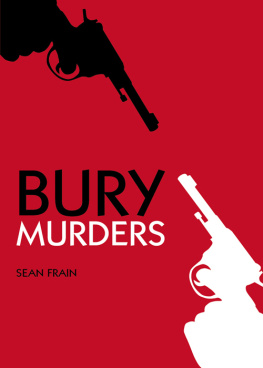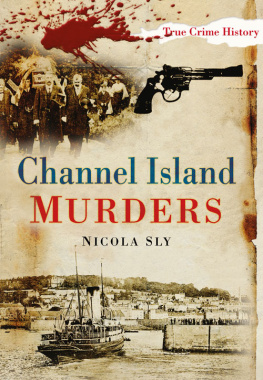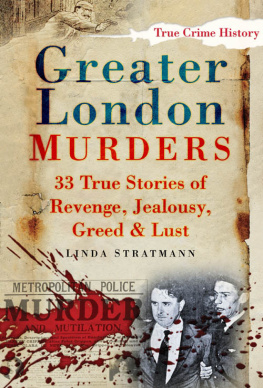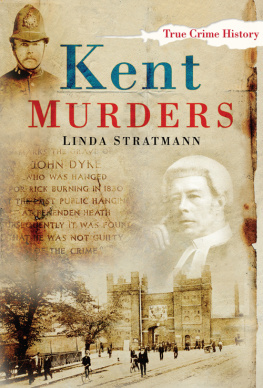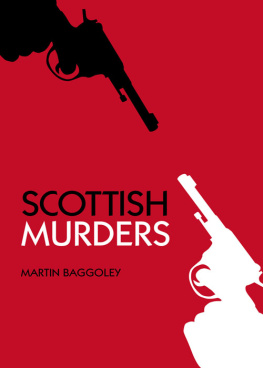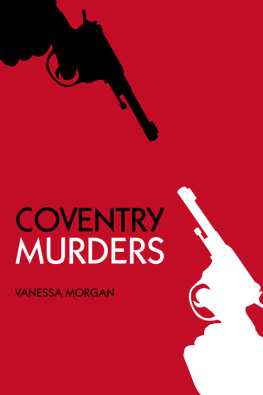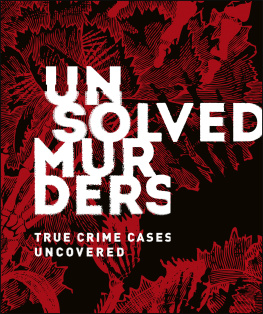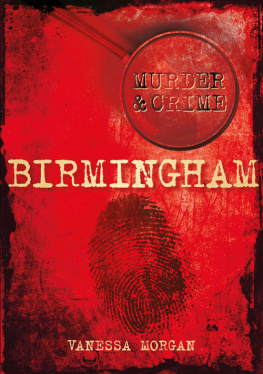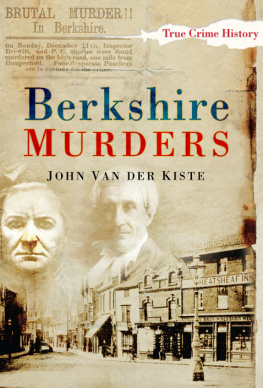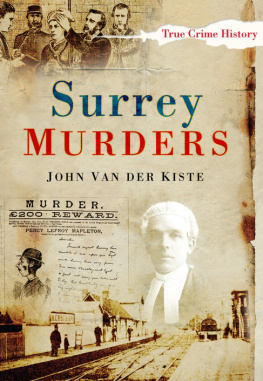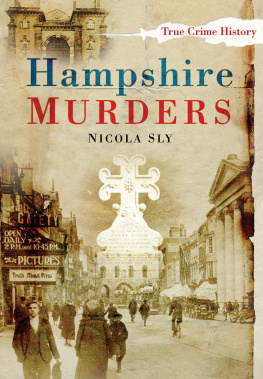CONTENTS
Bury is famous for a number of reasons, such as its world-famous market, its strong links to industry, and its leading industrialists such as Sir Robert Peel, both father and son. More recently, Bury has produced a number of famous people too, including celebrities from the world of music, comedy, drama and football, such as the group Elbow, Victoria Wood, Steve Halliwell, who made the character Zak Dingle in Emmerdale all his own, and the Neville brothers, who have enjoyed distinguished football careers for both Manchester United and England. But Bury is also infamous in many ways, though such infamy has mostly been buried, no doubt in the hopes that it will just go away. Burys infamous past, however, is as much a part of the history of the town as its triumphs, and should be recorded before it is forgotten forever. This is not in any way to glorify such events, but simply because true history should be recorded and, in the case of this book which focuses on murders in and around the town, because the names of the victims should not be wiped from the pages of history. They should be remembered and their terrible sufferings should be mourned.
When I first began researching the criminal history of Bury, I was astounded at not only the number of murders that have occurred, but at the sheer viciousness and callousness of some of these crimes, which are truly horrific and defy human logic and reason. You will understand my shock as you read through these terrible yet fascinating accounts, for surely the deepest imaginings of any sane person could not come up with such awful plots for other human beings, in many cases close relatives. Bury is thus infamous for such evil acts committed by a very select few of its residents and the crimes themselves, the court cases that followed and the sentences passed, feature in this book.
I was surprised to discover that a resident from the Bury area was the first person to be hanged in Manchester and I was even more surprised to discover the reaction of the public who made this hanging into a national event; some might even say a circus. Certainly, peoples attitudes towards criminals back in those days was far different to today, when those who commit such horrific and evil acts are often back on our streets and among society after serving only a few short years in prison. What struck me about Victorian times in particular, was that criminals who committed serious crimes such as murder were dealt with severely and promptly. Their trial was sometimes within weeks, sentence was quickly passed if found guilty and a very short time later the hanging itself took place.
Please be aware that some of the buildings featured in this volume are private dwellings and as such the reader is advised not to trespass on the property.
Sean Frain, 2014
Benjamin and Alice Cass were a happily married couple who lived at Birtle-cum-Bamford and by the year 1825 they were 64 and 80 years of age respectively. Benjamin Cass was a farmer, but by this time he was farming in a much smaller way than in previous years. His had been a prosperous establishment over the years and he had invested his profits wisely in property. He owned a number of cottages which he rented out and Saturday, 1 October 1825 was the due date for rents, though some of his tenants were in arrears.
Birtle-cum-Bamford was then a very rural idyll. The area today remains rural where farms and the occasional mill are located, though the urban sprawl from both Bury and Heywood has reached into what was once a mostly uninhabited region. The nearest neighbour to Benjamin and Alice Cass was at least a mile away and farming settlements were scattered about. Benjamin and Alice resided on the land they owned, but both were now getting rather frail and a neighbour of theirs would often sit with them on an evening and help out where possible.
On Saturday, 1 October 1825 a small number of people had brief contact with Benjamin Cass, and the lady who sometimes visited the ageing couple arrived later in the day and sat with them until 10 p.m. Benjamin was obviously a religious man, as when she was going she noticed that he had picked up his prayer book to have a read before retiring for the night. Alice was just beginning to undress, in preparation of putting on her night attire. She was just taking off her stockings when the visitor, unnamed in old newspaper articles recounting the events of that night, said goodnight and closed the door behind her as she went on her way home through the dark countryside.
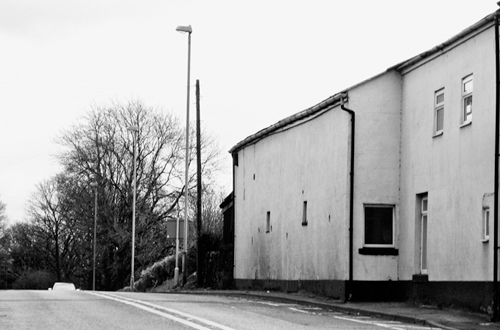
Birtle-cum-Bamford today.
Benjamins brother, Joseph Cass, was up and about early on that Sunday morning. He lived a couple of miles from his brother and went to see him first thing, arriving at the farm a little after 6 a.m. just as it was coming light. Being farmers they were obviously accustomed to being up and about early each day. Unusually, there was no sign of anyone astir and so Joseph opened the unlocked door and went inside. The interior was still quite dark, but he could just make out the form of his brother and his wife sat on chairs, but apparently asleep. Alice had her head on her husbands shoulder and both did not move as Joseph Cass entered the room.
Joseph tried to rouse the couple, using his voice at first, and then went over to shake them awake. It was then that he realised the pair were dead and that they had severe wounds about their heads. Blood was also on his hands. In a panic he ran from the house and went off to fetch a neighbour called John Chadwick. They arrived back about 15 minutes later and a truly horrific scene greeted them now that it was almost fully light and they could see the interior of the room.
The head of Benjamin was almost clove in two. His nose was almost completely severed from his face, hanging by a thread of skin, his chin severely cut open. The skull of Alice, who was seated next to her husband with her arms round his neck, was laid open and parts of her brain were scattered about the floor, her face badly bruised. A blood-spattered spade and poker lay on the floor nearby. It was obvious that the killer, a particularly sick and twisted individual, had placed the bodies in that position after the gruesome and horrific attack had ended.

The authorities were called in and their immediate thoughts were that the motive was unlikely to have been robbery, as a watch lay on the table in the room where the attack had taken place which could not have been missed by someone intent on stealing from the old couple. It was soon discovered that some people owed rent to Benjamin and this was considered as a possible motive for the murders. Enquiries by the authorities were fruitless regarding those who owed rents to Benjamin, due on the very day of his murder, but leads directed the investigations to the City of Manchester some ten miles or so from Bury. However, it seems such leads ended in disappointment. Any kind of dodgy dealings on the part of Benjamin which could have led to a motive for his murder were also ruled out, as people who knew him well were all of the same opinion; Benjamin Cass was an honest and peaceable man who was highly unlikely to have made enemies of those he dealt with.

At Halifax a man named John Diggles visited a number of people he knew and tried to sell them a pair of shoes, a suit, waistcoat and a pair of spectacles. How the authorities heard of this is unspecified in accounts written at the time, but possibly one of the several folk who were approached by Diggles may have heard of the murders at Bury. Knowing Diggles had been in that area and seeing him attempting to sell clothes that obviously did not belong to him, they might have contacted the local authorities who then contacted the authorities in Bury. However it happened, John Diggles was arrested at Halifax and taken back to Bury where he was questioned about the murders.

